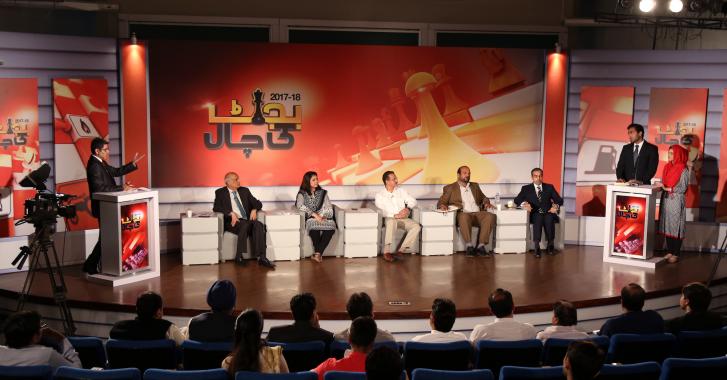
Lahore Univeristy of Management Sciences (LUMS) hosted the GEO television programme, ‘Budget Ki Chaal’ on May 22, 2017. The show’s primary aim was to discuss Pakistan’s National Federal Budget and allow students from LUMS to give their input on what the new Federal budget should look like. The show was hosted by presenter, Shuja Ayaz and accompanied by a panel of guest speakers.
The panel consisted of Huzaima Bukhari, Advocate High Court, Editor 'Taxation' and adjunct faculty at LUMS; Dr. Mahmood Khaliq, Senior Research Economist at the Pakistan Institute of Development Economics; Manzoor Ul Haq Malik, Vice President Federation of Pakistan Chambers of Commerce and Industry (FPCCI); Kamal Mian, Director Fast Cables Limited and Convenor Standing Committee on Sales and Taxation (Lahore Chamber of Commerce and Industry) and Aamir Fayyaz Sheikh, Chairman All Pakistan Textile Mills Association (APTMA).
The programme started off with the host Shuja Ayaz asking the panel questions regarding their insight on the current Federal budget and what they should look for when the LUMS team present their version of the budget.
The question was presented to Mr. Manzoor Malik who was also asked what the Federal budget does. Mr. Malik answered that “the budget should firstly collect ground realities and give an appraisal.” He went on to say that the current way a budget is made is too cumbersome and that it takes a long negotiation process with the government that does not always yield results.
Mr. Ayaz then asked Huzaima Bukhari how Pakistani taxes should be dealt with. Ms. Bukhari answered that Pakistan deals with a lot shortcomings, namely its lack of accepting responsibilities, which in turn limits the government from being efficient when addressing taxes.
Aamir Fayyaz was asked about the prime problem when creating a Federal budget, namely oil prices and taxation levels and how should it be handled. Mr. Fayyaz stated that the largest challenge when creating a reliable Federal budget is the current trade deficit of 30 billion dollars as well as the 11 billion dollar gap that the current government will have to borrow to fill in to move the economy forward.
Mr. Ayaz then raised a point that concerned him regarding the population of 20 lakh young adults and what they should do to become an integral part of the Pakistani community. Dr. Mahmood Khaliq addressed the question and replied that the budget reflects the government’s priorities and what the Pakistani community is in dire need of and for that financial allocation is not a solution.
Dr. Khaliq was also asked what he would like to see in the budget. “When we look at a business, we do not take a wish list from different departments and sections for the next year. A business looks at growth that is what I would like to see,” he stated.
After a short break the audience was given a chance to raise their concerns. One audience member, Darshan Singh stated that it is impossible to get a refund claim by the government, since they have made the process lengthy and confusing. Khurram Shahzad another audience member said that despite planning and methodologies, the way we utilise and generate revenue is not entirely efficient. Lastly, Nazim Maqbool expressed his concern that the budget should focus on direct taxes and our focus should primarily be on economic growth.
After another short break, the LUMS team took the stage to present their Federal budget. The team consisted of Fatiq Nadeem, Rabia Khan, Syed Mansoor Aamir and Sahil Nisar. Fatiq Nadeem and Rabia Khan spoke on behalf of the team. Both students are Economics majors and hail from the Mushtaq Ahmad Gurmani School of Humanities and Social Sciences (MGSHSS).
The two raised concerns over the current way the Federal budget is made. Mr. Nadeem stated that currently budgets are made without thinking about long-term goals. He expressed that their approach to their budget is based on the ‘Priority Set Capability Approach.’ This approach is defined by its choice of focus upon the moral significance of an individual’s capability of achieving a goal they value.
Also Mr. Nadeem raised a point that people should be given the initiative to change, and that allowing them to do so will bring focus on where budgets should be prioritised.
Rabia Khan expressed her concern over different issues currently plaguing Pakistan. Emphasising on the education sector, she said that the fact there are no efforts being put into the quality of education in the public sector is disturbing. She proposed that the public sector would benefit from the partnership with a private institution. She also proposed the same for the health sector.
The two raised concerns regarding the World Economic Forum’s report on the Urban Water Crisis. According to the 2014 report, Lahore will have a scarce supply of clean water by the year 2025. To counteract this, the two gave their solution, which was to raise the price of water as this would decrease water consumption.
Ms. Khan suggested that Pakistan should focus on direct taxes rather than indirect ones; they should also be localised, prioritising the needs of the locals.
In their final statement, the duo said that the focus of their budget was on people helping themselves, identifying their problems and learning how to solve them.
The presentation by the LUMS team was well received by the panel and they applauded their ingenuity, their observation in highlighting problems and coming up with effective solutions.












